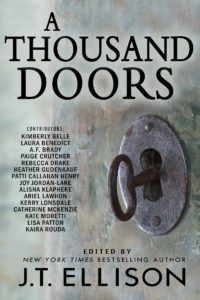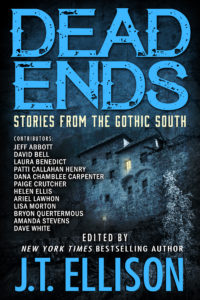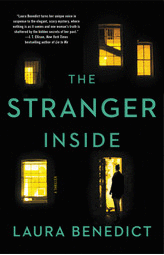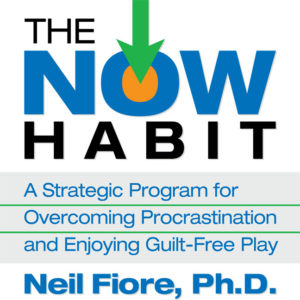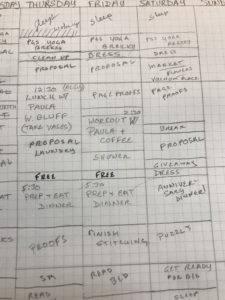Author Archives: Laura Benedict
Hill House and Adaptations: Happy Halloween ’18!
I’m not sure when October became Halloween month, but I’ve decided it’s not such a bad thing. Over the past few weeks I’ve gotten lots of good recommendations for scary books and films. My husband and I made it a point to watch some beloved old-school scary films together, including The Haunting (based on Shirley Jackson’s The Haunting of Hill House), The Sentinel, and Rosemary’s Baby.
We also watched the television series, The Haunting of Hill House, the Netflix adaptation *cough cough* of Jackson’s novel. Ahem…
Have you read the 1959 novel? If you haven’t, then I’ll wait here while you do. Don’t worry. It’s long, but I promise you’ll speed right through it. But if you’re too busy, here’s the premise: University professor studying psychic phenomena gains access to a reputedly haunted house called Hill House, and brings along a presumed psychic (Theo), a disturbed young woman (Eleanor) who ostensibly caused rocks to rain on her house, and a young man (Luke) who is a descendent of the ill-fated family who built the house. They investigate over a period of a few days, and Many Scary Things happen. Someone dies.
I LOVE THIS BOOK. It’s also beloved by legions of fans. It’s nuanced and original, yet also and comfortingly familiar, with its haunting tropes like creepy statuary, darkness, unidentified banging, unsettling architecture, mysterious writing on the walls, a harrowing origin story, and bizarre servants who won’t stay after dark. But the true strength of the novel is that it is less a horror story than a tale of psychological suspense and festering fears and tensions. In fact, it was nominated for the National Book Award.
The 1963 black-and-white film adaptation adheres pretty closely to the book, and Julie Harris is brilliant as the fragile virgin, Eleanor.
We only speak in hushed, abashed tones about the 1999 Catherine Zeta Jones remake.
Husband and I began watching the Netflix series set in both the present and the 90s with heightened expectations. Then we almost didn’t make it through the first hour. I confess, we were pretty angry. Nothing felt right, and very little felt familiar. For openers, the house is ostensibly being renovated in order to be flipped by the Crain family. Um, what? There are five children in the family, and Timothy Hutton and Carla Gugino play the Crain parents. The children are named Steven, Luke, Nell, Theo, and Shirley. Again, what? The adult Steven Crain is a bestselling writer who made a bajillion dollars telling the family’s darkest stories in his novels. Shirley is an undertaker, Luke, a heroin addict, Theo, a psychotherapist, and Nell–well I can’t remember, but it was something innocuous. They’re estranged from their father, and their mother is dead.
Thank goodness for terrific child actors–the kids who play the young Crains were very, very good.
The two story lines eventually bear each other out. We discover why the mother died, and how she was killed. We learn what’s truly wrong with the house. But very, very little of this plot has anything to do with the book or the 1963 film. It’s as though the creator were a magpie who took all the sparkly bits of the novel and sprinkled them through an entirely new story.
Forgive my being vague, but I want to avoid spoilers in case you want to watch it. Which you should! It’s very good if you simply dismiss any notions you have about the book or the 1963 film. It does stand on its own beautifully. And, in my opinion, it should just be called The Forever House. But no one asked me, darn it.
So, has anyone else seen the series? Read the book? Seen the 1963 or 1979 films? If so, what do you think of them?
Something else to consider: What adaptations of your favorite novels elicit strong opinions from you, either way.
25 Ways To Avoid Writer’s Butt*
A handy list for your writing day:
- Don’t write.
- If you choose to write, don’t eat while you’re writing.
- Chain yourself to your desk to keep from going to the kitchen.
- If your desk is in the kitchen, you need to move your desk.
- Don’t write about food unless you’ve just eaten. It will make you hungry.
- A candy treat is a fine reward for a potty-training toddler, not grown-up writers who’ve squeaked out 100 words in three hours.
- A single glass (not bottle!) of wine, spirits or beer is a fine reward for finishing your work for the day.
- Take your dog or cat for a walk. Bonus points if you’re not staring at your phone.
- Exercise before you write. Let writing be your reward. (Hey! Stop laughing!)
- When you get stuck while writing and find yourself headed for the kitchen, scream DON’T DO IT at the top of your lungs and do 10 push-ups. Knee push-ups count.
- If you’re on the phone kvetching with another writer about the sad state of publishing, your life, your advance, or your Writer’s Butt, wear a headset and walk around and around your office, living room, front yard. Bonus points for each 1K steps you take.
- Keep your fridge and cabinets stocked with food you hate, or food that takes preparation.
- Get a standing desk and a good mat on which to stand.
- Nap, at your desk, or napping place of your choice.
- Take your dog or cat for another walk.
- When you temporarily forget how to write, listen to an audiobook by a writer who inspires you as you walk, jog, etc.
- Don’t write when you’re exhausted. Exhausted writers are hungry writers.
- When you’re not writing, make your diet as carb-loaded and awful as possible. Then you’ll have acid-reflux the whole time and won’t be tempted to eat.
- Take a dance break.
- Write stomach-churning prose.
- Wear pants that are already uncomfortably tight instead of yoga pants.
- Use the Pomodoro method. This one is online, but you can get yourself an actual timer for your desk.
- Write at the library and leave your money in the car so you can’t use the vending machines. Bonus points for parking far away.
- When you’re reading, walk around the house. You know you did it as a kid. Watch out for the dog.
- During your writing time, turn off the Internet, have a tall glass of water on hand, and write like a demon. You’ll feel so good and accomplished when you look at those pages that you’ll either not care if you have Writer’s Butt (always an option!), or you’ll feel so virtuous that you’ll make yourself a healthy dinner, have a glass of wine (or not), take the dog for a walk, get a good night’s sleep, and do it again tomorrow.
*Disclaimer: I have used all 25 methods at various times, and my Writer’s Butt comes and goes. As to number 3, I have gotten so tangled up in the huge number of power cords around my desk that I may as well have been chained because it was a real pain to try to get away from my chair and go to the kitchen.
Okay TKZ-ers! Please share your Avoiding-Writer’s-Butt strategies. We’re listening…
The Fifth Floor: First Page Critique
Happy Wednesday, everyone! Another anonymous Dear Author is here to share some work today. Check it out…
The Fifth Floor
A kid rolls by on a skateboard. It’s old—maybe one he inherited from his father—and layered with stickers bearing the logos of early-nineties ska bands. Streetlight Manifesto, Hepcat, Five Iron Frenzy, The Toasters, Reel Big Fish.
“Do you want to make twenty bucks?” I ask, amplifying my voice just enough for it to carry over the wind.
The kid looks behind him, startled, but doesn’t lose his balance. Impressive.
I’m sweating like a jonesing addict despite the sixty-degree weather. My hair, once thick and lustrous, feels like a dank rag draped over my head.
With a degree of coordination I’ll never master, the kid shifts his weight to reverse the skateboard’s direction and comes back toward me. The board skids to a stop on the sidewalk two feet from where I stand.
“You say twenty bucks?” In his eyes, I detect more curiosity than suspicion. If I were a man, standing on the sidewalk in this same middle-class neighborhood, he’d probably have kept going. Maybe called the police from the cell phone I’m sure weighs down one of his pockets.
“You heard right.”
“I don’t deal drugs.”
“Never thought you did.”
The kid’s trying to look like a street punk, with a ratty tee shirt and worn cargo shorts that almost slip off his narrow hips. I’d put him at ten or eleven. But he’s clean, his hair’s been recently trimmed, and braces puff out his thin, pale lips.
“What do I gotta do?”
“What do you have to do,” I correct automatically. Bad habits.
The kid snorts. “You a teacher or somethin’?”
“Hardly. Listen, all I need you to do is go with me to that public storage place across the street. See it? Just ride up the elevator with me to my unit, then use my code to go back down. That’s it.”
He studies me for a moment through intelligent brown eyes. Probably sussing out potential reasons behind my odd request. “What’s your name?”
“Roxie,” I reply.
Shit. I’m so not cut out for this. Why couldn’t I have told him Angela or Kate or Thomasina?
“I’m Kevin.”
“Nice to meet you.”
We shake hands. His grip is firm and perfunctory. Somebody’s taught him well—maybe the father who gifted him the retro skateboard.
“Ready?” I ask.
He shrugs. “Okay. When do I get the twenty bucks?”
“When you leave me on the fifth floor.”
“Deal.”
_______________________
Today Dear Author has made my job tough by writing so well. Let’s talk about all the things that are spot on with this gem of an opening.
Opening paragraph:
A kid rolls by on a skateboard. It’s old—maybe one he inherited from his father—and layered with stickers bearing the logos of early-nineties ska bands. Streetlight Manifesto, Hepcat, Five Iron Frenzy, The Toasters, Reel Big Fish.
I wish I knew if this were an opening to a novel or a short story. It feels to me like a short story, but I wouldn’t wager money on it. Immediacy is critical to any written story, and this paragraph draws us right in. We observe the kid, with an extra added bonus of movement. He “rolls by,” rather than “goes by” or “passes by.” Nice. We know the kid is a boy, and that the narrator seems to have been waiting.
The narrator is observant, and even makes up a small story about the skateboard and the boy’s dad. We don’t know that it’s a true story, of course, but it tells us that the narrator likes to provide possible reasons and explantations for the things she sees. It’s a hint that she may be a bit of a fantasist. In truth, the kid could’ve just come from stealing the skateboard from another kid or a pawn shop. That said, she also seems to know about 90s ska bands, and this detail tells us that it’s probably a contemporary piece.
“Do you want to make twenty bucks?” I ask, amplifying my voice just enough for it to carry over the wind.
The kid looks behind him, startled, but doesn’t lose his balance. Impressive.
It’s dialogue that drives this opening page and keeps up the theme of immediacy. I do take issue with the word “amplify.” Technically it’s okay, but it makes the narrator sound old, and her word choice stilted. But she also uses the very casual word, “bucks.” One of those two words should be changed. I vote for losing the “amplify.” Also, does the wind show up again?
The next sentence is perfect. The kid has skills.
I’m sweating like a jonesing addict despite the sixty-degree weather. My hair, once thick and lustrous, feels like a dank rag draped over my head.
More description of the narrator. Ew. She’s seen better days. I’m curious! I can almost feel the dankness.
With a degree of coordination I’ll never master, the kid shifts his weight to reverse the skateboard’s direction and comes back toward me. The board skids to a stop on the sidewalk two feet from where I stand.
Does the narrator ride skateboards? It feels like that’s indicated when she speaks of a “degree of coordination.” Or is she just awkward in general? Maybe “heads back,” rather than “comes back.” That the kid stops the board so suddenly is interesting. He seems rather aggressive, which I didn’t get at first.
“You say twenty bucks?” In his eyes, I detect more curiosity than suspicion. If I were a man, standing on the sidewalk in this same middle-class neighborhood, he’d probably have kept going. Maybe called the police from the cell phone I’m sure weighs down one of his pockets.
Okay. So they are in a middle-class neighborhood. I didn’t see that coming. I think I was picturing a busy street. Are there public storage rental places in middle-class residential areas? Nice detail about the phone and the pockets.
“You heard right.”
“I don’t deal drugs.”
“Never thought you did.”
A telling exchange. I like that the boy is matter-of-fact, but cautious.
The kid’s trying to look like a street punk, with a ratty tee shirt and worn cargo shorts that almost slip off his narrow hips. I’d put him at ten or eleven. But he’s clean, his hair’s been recently trimmed, and braces puff out his thin, pale lips.
In his ratty tee shirt, and worn cargo shorts that threaten to slide from his narrow hips, he’s trying hard to look like a street punk. But he doesn’t quite pull it off. He’s clean, his hair’s been recently trimmed, and braces puff out his thin, pale lips. I’d put him at ten or eleven-years-old.
I’m a big fan of this piece’s short, declarative sentences, but you don’t want to start out too many of them with, “The kid…”
“What do I gotta do?”
“What do you have to do,” I correct automatically. Bad habits.
Funny. Do the bad habits belong to the narrator, or the boy?
The kid snorts. “You a teacher or somethin’?”
“Hardly. Listen, all I need you to do is go with me to that public storage place across the street. See it? Just ride up the elevator with me to my unit, then use my code to go back down. That’s it.”
Very clear. I’d go!
He studies me for a moment through intelligent brown eyes. Probably sussing out potential reasons behind my odd request. “What’s your name?”
“Roxie,” I reply.
Shit. I’m so not cut out for this. Why couldn’t I have told him Angela or Kate or Thomasina?
This is very telling about the narrator, and does make her sound young, and inexperienced at making weird requests of an eleven-year-old boy. She no longer sounds stiff.
“I’m Kevin.”
Charmingly proactive to introduce himself so boldly.
“Nice to meet you.”
We shake hands. His grip is firm and perfunctory. Somebody’s taught him well—maybe the father who gifted him the retro skateboard.
Also excellent. I like that she carries the her fantasy about the dad forward.
“Ready?” I ask.
He shrugs. “Okay. When do I get the twenty bucks?”
“When you leave me on the fifth floor.”
“Deal.”
Terrific cliffhanger here. They are off to the storage unit. What can be there, and why does she want him to leave her up there????
_____________________
Overall, I’m delighted with this piece and would like to read more. My comments are essentially line edits. We get a great picture of the boy, who seems to think he’s streetwise, but who also can’t get over having manners. The narrator, too, is interesting. With a little tweaking she can be more consistent and defined.
TKZers! I couldn’t find all that much to say. What are your thoughts?
Thanks for sharing this first page, Dear Author!
Just Write the Story
Have you ever felt like every idea you currently have your finger on totally…sucks? That you may never have another good story idea?
I’ve been struggling with a short story for weeks and weeks. Not struggling with a single, specific story, but with FOUR beginnings of stories as I try to distill one. This isn’t a situation I’m used to, or particularly like. (I’m sure that I’m the only one this has happened to, right?) As those beginnings rolled around in my head, I’d stop to type out a page. Then stop. The idea never quite made it past another couple paragraphs.
This may be the absolute worst part of being a writer. Or at least being a writer under deadline.
I decided to get help from my resident writer guy/bedfellow. (Paraphrasing ahead because in real life conversation is rarely linear–something to remember as you write fiction. Think of the following as a kind of passion play. On writing.)
Me: I need to talk about something. [Trying not to sound too dire, yet going for serious. Because I am.]
Husband: Sure. [Isn’t he nice?!]
Me: So I’ve been trying to work on this story for a long time now. I just feel like–I don’t know–like I’ll never be able to write another short story again. Like I’ll never have another good idea. They’re just gone. [Confession: I know it’s a bit of a whine. A cry for help because what writer wants to EVER feel this way?]
Husband: Yeah, that sounds tough. You sound like you feel pretty bad. [I love empathy, don’t you? Yes, we’ve both had plenty of practice with, um, professional listeners.]
Me: *sigh* It’s a horrible feeling. What if I never have another decent idea?
Husband: That’s unlikely. But you could always get a job at Dairy Queen. [We are both big DQ fans.] Somebody–I don’t remember who, maybe someone we interviewed–mentioned they teach your Bug Man story in their writing classes all the time.
Me: That story just came to me all at once, you know? In one big piece. It was a giant gift from the sky. I don’t think I really had much to do with it. And then a couple of my stories got nominated for prizes. How can I write another story and have it not be as good? [This is a real feeling, y’all.]
Husband: So what if it’s not as good? [You can see who the Devil’s Advocate is in our house.] You just have to write a story.
Me: It just feels like the end of everything. [Apocalyptic scenarios are my specialty.][Intentionally ignoring the suggestion that my next story might not be as good as my former best. My currently fragile ego obviously can’t take it.]
Husband: You think you’ll spend the rest of your life not writing? [Why doesn’t he sound more alarmed, I want to know.}
Me: If I don’t have any ideas, I can’t write. Short stories, anyway. [Note to editor and agent: the current novel is going FINE] I don’t think I’ve ever felt this way before. It’s scary.
Husband: Yeah, that’s not really true. [What? Is he kidding? Calling me a liar? Them’s fightin’ words.]
Me: What do you mean? [Trying not to sound indignant because that would only refocus the discussion on a non-issue and listening would quickly cease on both sides. That’s what a professional listener might say, anyway.]
Husband: I hesitate to tell you this, but you say this every time. Short stories, novels, whatever. Especially if you have a deadline. [I am speechless for a long moment.] Sorry, but it’s true.
Me: Really? [I’m experiencing a glimmer of familiarity, to my surprise. But it’s…uncomfortable.] Seriously?
Husband: Yep. Every time. [Similar scenes from the past threaten to overwhelm me, making my brain spin like a spiral cartoon graphic from old Batman or The Monkees shows. (Yes, I’m that old, and if you don’t remember them I pity your loss!)]
Me: Maybe…I guess. [I’m awesome at poker. You never know what I’m thinking.]
Husband: You should probably go write the story.
Me: You think I can? What if it sucks? [Please don’t say it could suck.]
Husband: It could definitely suck, but I don’t think it will. I’m sure they’ll take it. [!!!!!]
Me: They’re not going to want it if it sucks, though. [Logic is surely on my side, right?]
Husband: You don’t get to be the judge. You just have to write the story. You usually think your work is no good until someone else likes it. Or publishes it. Go write the story. [He’s repeating himself. Could it all really be this simple? Hope fills my head, displacing the cartoon chaos. I’m finally remembering…] So what’s for dinner?
Yes, Husband was perfectly correct. I do go through similar throes sometime during every project. It’s a crisis of confidence that appears to be part of my process. It can come right at the beginning, and/or sometimes when I’m about 3/4 in. I wanted to share this little drama with you to let you know you’re not the only one. I know there are writers among us–TKZers on both sides of the screen [cue creepy image of ALL the TKZ contributors stuffed into the back part of my Mac, typing away diligently]–who NEVER have a crisis of confidence. And more power to them! The rest of us have to wrestle with our work and stories until they become clear in our vision.
You won’t ever run out of ideas. I promise.
Oh, I found my story the next morning. It’s a synthesis of two of my story ideas, plus an added murder. [Of course there’s a murder–maybe two!]
So, dear TKZers, tell us a story about your crises of confidence. Do you have predictable panicked moments? Or do tell us how you’ve managed to avoid them!
First Page Critique: A Thing of Beauty
Gentle Readers, today another Brave Soul has brought their work to the critique altar.
Chapter 1. A Thing of Beauty
I’m forgetting things.
That’s not good when someone’s been murdered.
Not when I’m holding a gun in my hand.
My memories are all mixed-up. I watch myself… this memory thing… always watching for lapses. The war, my mom’s illness…
Or maybe the lump on the back of my head has something to do with it?
Or maybe I’m seeing ghosts.
Lemme try get things straight.
I remember how it started… She came to my office—or did it begin before then?
Fog and anger and my finger pulling the trigger…
No, I have to get this straight.
Let’s start with the meeting…
* * *
I was in my office—up two flights, turn right and I’m at the far end. It must’ve been late. It was getting dark. A Wednesday. I never understood Wednesdays. Too far away from both weekends. Not that I did much at the weekend. Especially when I couldn’t afford to play poker with the boys.
I was closing up. The usual things: scowling at the in-tray full of bills, checking my phone was still working, closing the inner office door, switching off the lights in the outer office… Someday I’ll be able to afford a receptionist to look after these things for me.
Someday.
In the darkness the harsh splash of neon lights from the street below splattered across the office ceiling like weapon flash. Movie-town was still making magic and bringing dreams to life with flickering lights. Spinning money out of dreams. Little changed while I was busy in Europe saving the world. Was it really five years since that Liberty ship offloaded me back onto American soil, to find my mother crippled and confused by a blood clot in her brain?
I don’t know how long the blonde was standing in the doorway while my mind wandered. Maybe she made a sound, I don’t know, but I snapped out of it and took a look.
She was a sweet shape silhouetted by the strip lighting in the hallway and topped by tumbling platinum hair. I took in the sheath of her pencil skirt and snug, fitted jacket. I wanted to see more.
Maybe she was just asking directions for another of the petty outfits in this rat-run of a decrepit building.
I flipped on the lights in the reception area.
_______________
Kudos to Anonymous Writer for excellent clarity of sentences and scene visualization. The prose is sharp and moves at a good clip. But, oh my, I’m not sure how to approach this piece. Is it meant to be an homage to noir detective films and stories? It feels less like homage than clever duplication.
The image that immediately popped into my head was of Fred MacMurray in the classic noir film Double Indemnity (novel by James M. Cain). It begins with his character making a recording in his office–a confession about his involvement in evil Barbara Stanwyk’s murderous insurance scheme that results in the death of her husband.
But a more direct parallel is to the opening of both the novel and film of Hammett’s The Maltese Falcon. Sam Spade does have a receptionist, and it’s not the end of the day. Still there’s a beautiful woman in distress who shows up at a less-than-profitable private detective’s office, and not too long after, something goes badly wrong. (I can only assume our first-person character is a detective.)
The third comparison is to J. K, Rowlings’s more modern character, Cormorant Strike, also a struggling detective.
The examples could go on and on because this is a classic, even clichéd scene.
First section:
“I’m forgetting things.” Then we’re presented with a litany of things they might have forgotten–or barely remember. I’m visualizing a cloudy collage above their head. Mom’s illness, bombs going off, a gun… It’s a voiceover, a setup. People don’t actually talk to themselves this way. If this is indeed an opening to a novel, it deserves better treatment. Here’s a person who believes they might have committed a murder. That’s a very scary prospect. Where’s the shock? The drama? They’re HOLDING A GUN. They can’t be just standing there about to drift off into a long reverie about how they got where they are. How much better to give us an entire scene.
Second:
The prose here is very good. I particularly like this line: “In the darkness the harsh splash of neon lights from the street below splattered across the office ceiling like weapon flash.” Again, a bit too familiar, but far more substantial as the first lines of a novel than the original.
I still have to ask, what end does the scene serve? It’s dour and sad and a little lusty: classic noir is classic noir. As it is, it doesn’t offer the reader anything new. My only advice can be to either change it to make it more surprising, or possibly drop the intro and start here. I’m frustrated.
So, TKZers. I’m handing this over to you. What do you make of it? Am I missing some vital point?
Many, Many Hats
Jobs I’ve had, in chronological order:
Babysitter, dry cleaner counter person, pizza maker, office supply sales clerk (never, ever let someone “try out” a fountain pen because it ruins the nib–ask me how I know), pizza maker, steak house hostess (many, many roach stories), misses department sales clerk, gift wrapper, shirt inspector (another dry cleaner), telemarketer (worst ever), temporary services receptionist, candy store clerk, radio station engineer, board operator, and announcer, production coordinator for a tech services multi-media department (basically AV department for giant corporate shows and concerts), sales promotion assistant (lots of incentive programs, binders, brochures–highlights include missing a typo on half a million theme park brochures that made the park look like it was open when it was closed), manager of a retail handcrafts co-op, copywriter/sales promotion freelancer, book reviewer, writer, writing workshop leader, homeschool mom.
It’s a bit overwhelming to look at this list. Of course, it encompasses forty-four years of my life. But the overwhelming bit comes when I think about all the things I had to learn to do those jobs. None were particularly difficult in terms of technology. Early on I learned to do as I was told, watch out for the grabby hands of customers and male co-workers, alike, and spend most of my time observing people and figuring out what they were really looking for. It was at the radio station that things became technically challenging. So I spent many, many hours learning the radio station and studio engineering job, and I loved producing. Also, I was fortunate that the Giant Beer Company bought into Macs for the office soon after they came out.
I didn’t start writing fiction until after I became fascinated with copywriting and spent a lot of time fiddling with copy I had commissioned. When the Giant Beer Company warned of layoffs, I (very boldly, and perhaps insanely) whipped up sample copy for imaginary businesses and appended it to my resume. Sales and advertising copy is, after all, a blend of persuasion, fact, and fantasy. (It was not an effective gambit, but it was a great writing and humility exercise.)
So I broke down and took some post-graduate fiction writing classes, and realized that everything I’d done–professionally and personally–up to that point helped me become a writer.
It makes me wonder about those students who first come into the creative writing classroom at age 18 or 19. What have they done? What have they seen or heard? (Though, trauma is an excellent teacher, as is a dysfunctional family.)
The writing life is perfect for someone like me, who truly appreciates novelty. In the past twenty-five years (particularly the last twelve) I’ve discovered that to be a professional writer, or even a dedicated amateur, one has to become proficient at many jobs, and willing to keep learning and learning.
The latest thing I learned is how to make a .gif of the cover of my upcoming book, The Stranger Inside. Fingers crossed that it’s still giffing when you see it. If you want to make your own .gif, try it here. It’s super easy!
Here’s what this writer has learned to become:
Publisher, production co-ordinator, writer, copywriter, editor, designer, cover designer, photographer, telemarketer, baker (for goodies taken to appearances), mailroom attendant, bookkeeper, trimmer, folder, press release writer, travel agent, contest-fulfiller, social media maven, mailing list keeper, public speaker, researcher, long-haul driver, occasional shameless self-promoter, interviewer, interviewee, panelist, cheerleader, blogger, website designer…I’m sure I’ve missed plenty. Can you think of more jobs that you do as a writer?
Tell us: What in your background prepared you for being a writer? How is your life different?
The Getting and Keeping of Ideas
I was thinking about the way people ask me where I get my story ideas. It’s a classic but awkward question, especially if my ideas are at a low ebb right then and I’m certain I’ll never have another idea for a story. It’s like when my son complains and complains that we never have anything interesting for dinner, and I ask him before I go to the grocery what he would like me to make. Usually he can’t think of anything right at that moment and gets frustrated. (The answer is, more often than not, tacos. Something I make frequently.)
There are times when I can’t come up with an idea to save my own life. It’s embarrassing to admit, especially because I also have to write all of my ideas down quickly or they’ll slip away and eventually find some other writer to express them.
A writer I admire once told me that if you can’t keep an idea alive in your head, then it’s not actually a good idea. While I can see a vague point to this–some ideas demand to be written immediately–I mostly disagree. People sometimes get obsessive even with bad ideas. I frequently consult my banked story ideas in both the fallow times and the flush. I find that I can pretty much make a story out of any of them. And that’s reassuring.
My usual answer to anyone who asks about where I get my ideas is:
“Oh, everywhere. I never know when I’m going to run across a crime story online or see something on the news.”
What’s going through my head:
“Dear God, do you know how much time I spend making notes on or bookmarking stories? There are crime and news websites that I stalk relentlessly. Or I’ll be reading a book someone else has written and a character says something that catches my imagination, and I stop reading and start daydreaming. Then there’s my childhood. Someday that gorilla in the Pepto-Bismol pink bathroom I dreamed about when I was five is going to have its own kid’s book. And I was the proverbial little pitcher with big ears, soaking in the stories and gossip around the grown-ups card table. Throw in emotions, dreams, overheard personal dramas, the sociopath I went on two dates with before things got super weird and I eventually had to leave town for good. Don’t forget the divorce played out in my kid’s carpool line, and the woman with the severely bitten nails in the waiting area of the therapist’s office.”
Here’s one of my favorite character quotes. It’s from Ariadne Oliver, a writer who shows up in several Poirot stories.
“I mean, what does one say about how one writes books? You just think of an idea and force yourself to write it.”
Just think of an idea. No biggie.
Do you keep files or idea banks of ideas, or do you wing it? How do you approach the where do you get your ideas question?
Hometown
This week I’m visiting my hometown of Cincinnati, Ohio. I only lived here for the first six years of my life, but a child’s first five or six years is a foundation for what’s to come. It’s a place of literal firsts, like first steps, first car ride, first pet, first friends, first happiness, first scrape, first heartache. And those firsts may not be consciously remembered, but they inform who we are.
This city has always been a touchstone for me, with plenty of family here to reinforce my memories. When I’m here, no matter what I’m doing or seeing, I feel a sense of permanence and history. I’ve lived other places for much longer periods of time, but Cincinnati is special.
As writers, we can’t escape having our earliest experiences inform our work. I set two of my published short stories and my second novel, Calling Mr. Lonely Hearts, here. As I wrote, I mentally traveled over the city’s many hills, recalling its striking architecture, its many bakeries, old neighborhoods with beautiful parish churches, and a baseball stadium or two. And then there’s the river. Always the river.
Calling Mr. Lonely Hearts and the stories set in the city are dark, suspenseful works. The characters are (mostly) human enough. But a lot of each story is wrapped up in my worries and experiences of being very shy, and being Catholic, immersed in a culture built on Original Sin and ancient mysteries. The child I was was very present as I wrote. And while the sum of our experiences is in every word we write, those early experiences have been with us the longest.
TKZers, please us about your hometown and how/if it affects your writing.
The Procrastination Habit
Procrastination is so rife among my writer friends and other creatives I know that we don’t even joke about it. We are clichés. While I would never lie about procrastinating when I’m supposed to be working, I rarely volunteer the fact. If another writer confesses to me that she’s procrastinating on getting pages done, I feel a huge sense of relief. There’s no misery like procrastination misery to build solidarity between writer friends.
Even some of the most productive bestselling writers I know sometimes procrastinate. Personally, when I’m in my deepest procrastination moments, I forget that. It feels lonesome, and I become my own harshest judge. (That whole comparing oneself to other writers is deadly too, but we can consider that another time.) Being judgy while procrastinating is doubly unhelpful.
Procrastination offers an escape from tension. If I have a project (or chapter or paragraph or phone call or chore) that makes me feel anxious, I sometimes literally walk away from it. It might be for five minutes. It might be for an hour. It might be for weeks. Eventually I’ll return to it–or, if it’s some kind of chore or event–my lack of action will mean it expires and goes away.
Avoidance. It’s embarrassing to admit that I’m sometimes guilty of it. Ouch.
I’ve read many, many books to try to improve my productivity, shape my behavior, and, yes, fix my procrastination habit. Because it is a habit, not a disease or fatal flaw.
Here’s the latest book I’ve read on the subject:
I listened to it on audio via Overdrive and liked it well enough that I bought the ebook. (I often do that, anecdotal proof that library reads influence consumer book purchases.)
Notice that appealing subtitle. “A Strategic Program for Overcoming Procrastination and Enjoying Guilt-Free Play.” How sexy is that? I couldn’t resist checking it out when I was browsing available audiobooks. The subtitle worked on me exactly the way I’m sure it was intended: put the focus on the positive, not the procrastination.
KillZone is not the place for book reviews, but is about the writing life. So I’ll be brief.
THE NOW HABIT
- Helps you identify when and why you might be procrastinating.
- Doesn’t judge you for procrastinating–and even explains how it becomes an active coping tool.
- Doesn’t prioritize work over pleasure (a real revelation for me).
- Offers some compelling client stories.
- Has focus exercises and talks about the process and importance of flow.
- Helps you create your own “unschedule.”
- Has a good section about dealing with the procrastinators in your life.
- Explores goal setting.
The “unschedule” is my favorite piece of the process because it turns one’s schedule upside down. After blocking out the time you require for life’s necessities like eating, cleaning, sleeping, and tending dependent creatures, you mark out time for things that give you pleasure and put you in a state of play or creative play. Working out, practicing hobbies, spending time with friends. It might happen daily, weekly, or bi-weekly. Whatever you choose. It becomes a priority. A reward to work toward.
Work (or writing or publishing business for most of us here) can become more energizing. More efficient. I confess that on the days I’ve managed to put this into serious practice, I’ve found myself happily working overtime, sometimes working well into my scheduled pleasure time–but not feeling a bit deprived because I know I’ll get to play again soon. Also, I’m getting a huge amount of pleasure from my work hours.
I know many people who have always operated their lives this way. They tend not to be procrastinators, and are what Fiore calls “producers.” If you are one of those people, you either stopped reading this a long time ago, or are shaking your head, wondering what’s wrong with the rest of us. Congratulations! You are in a really good place.
I’ll give you a peek at a part of my “unschedule” from last week. Up to last month, my two primary jobs were writer and homeschool mom. Now I’m a writer with a rising college freshman in the house, so my time is primarily mine to schedule. Everyone’s life circumstances are different, so your mileage will vary.
I make my schedule in pencil because it never works out exactly as I plan and I like to go back and put in what I actually do. It’s quite revelatory for me.
Dealing with procrastination can be a real battle. Particularly for writers. Not all, of course. I’d love to hear from both sides of the aisle. What do you do to fight procrastination, if you fight it at all? If you don’t, what keeps you focused on your goals?
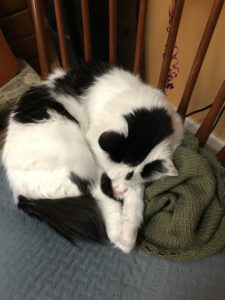
(I won’t tell you how many times I got up from my chair and wandered out into another part of the house as I wrote this. But here’s what happens if I’m gone for even a minute!)


